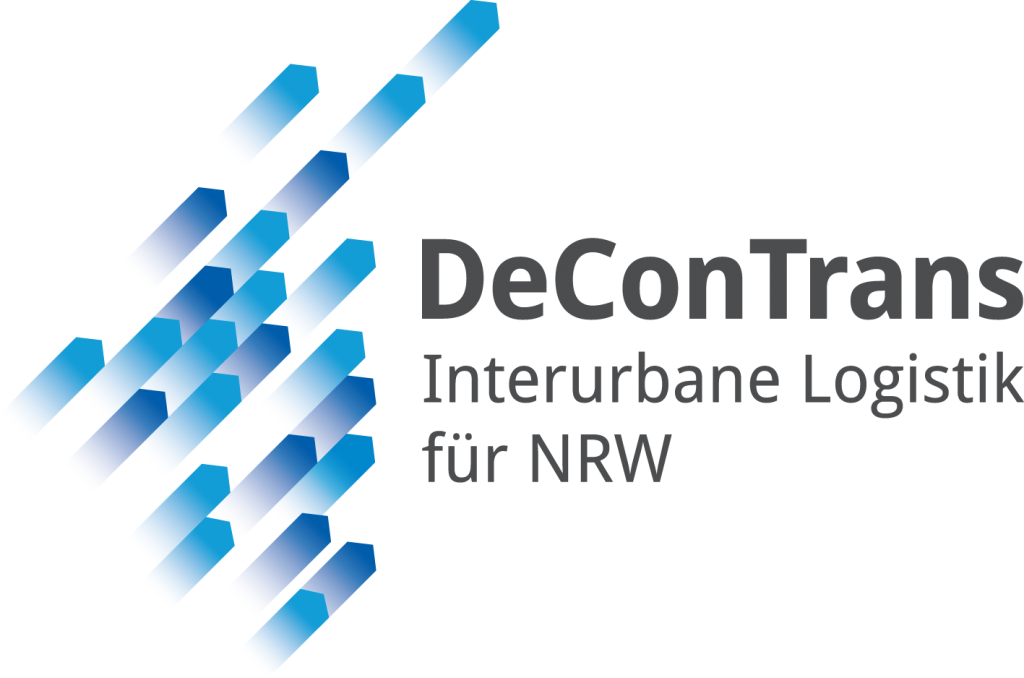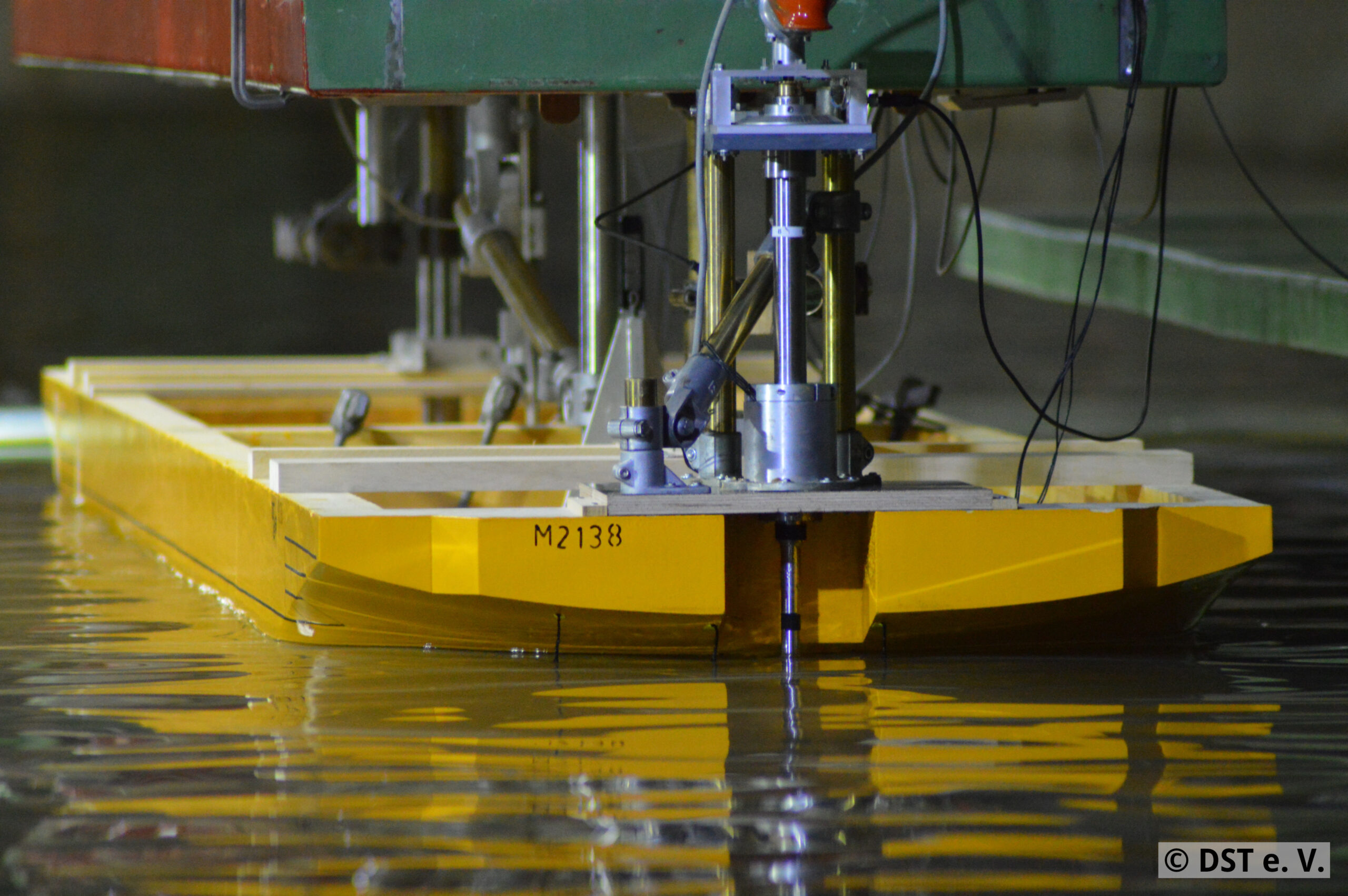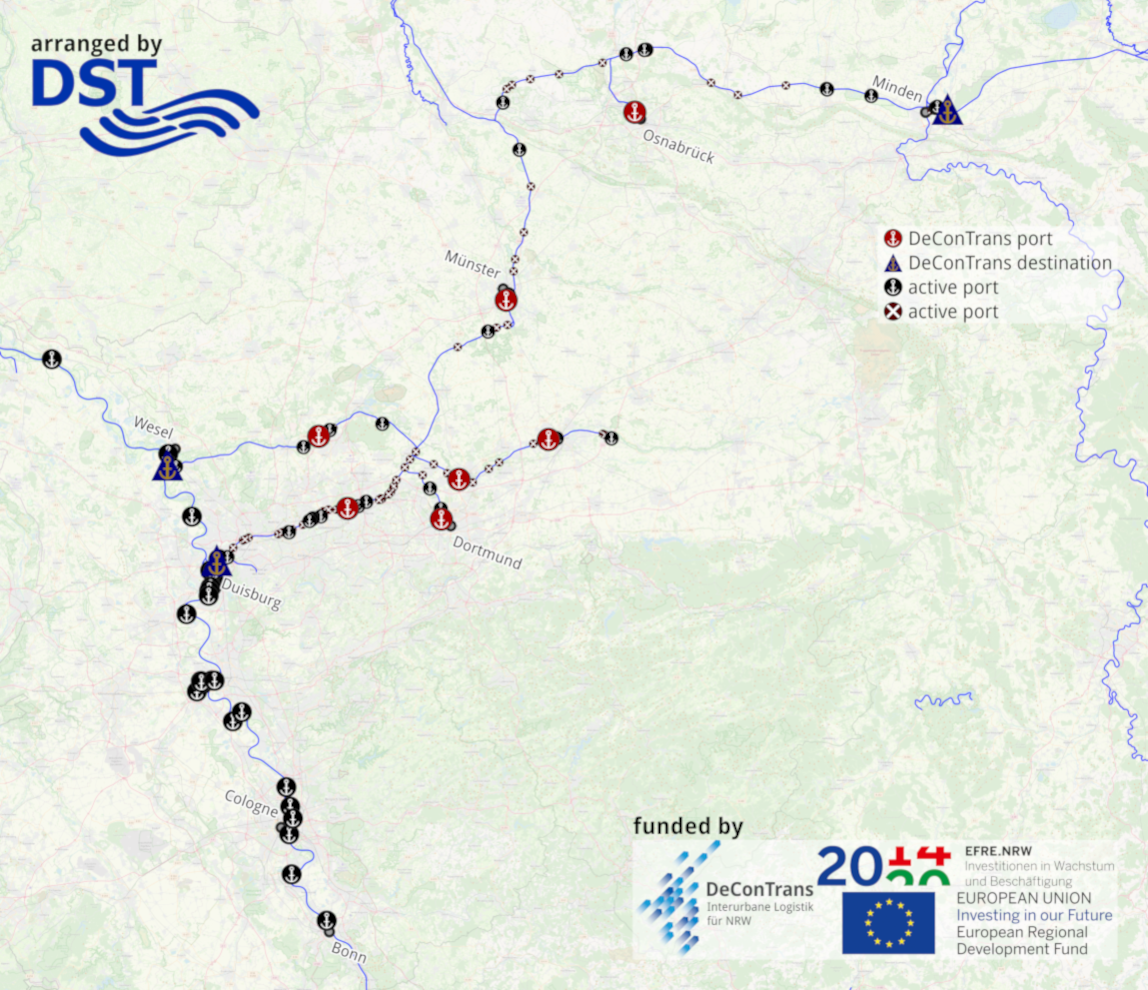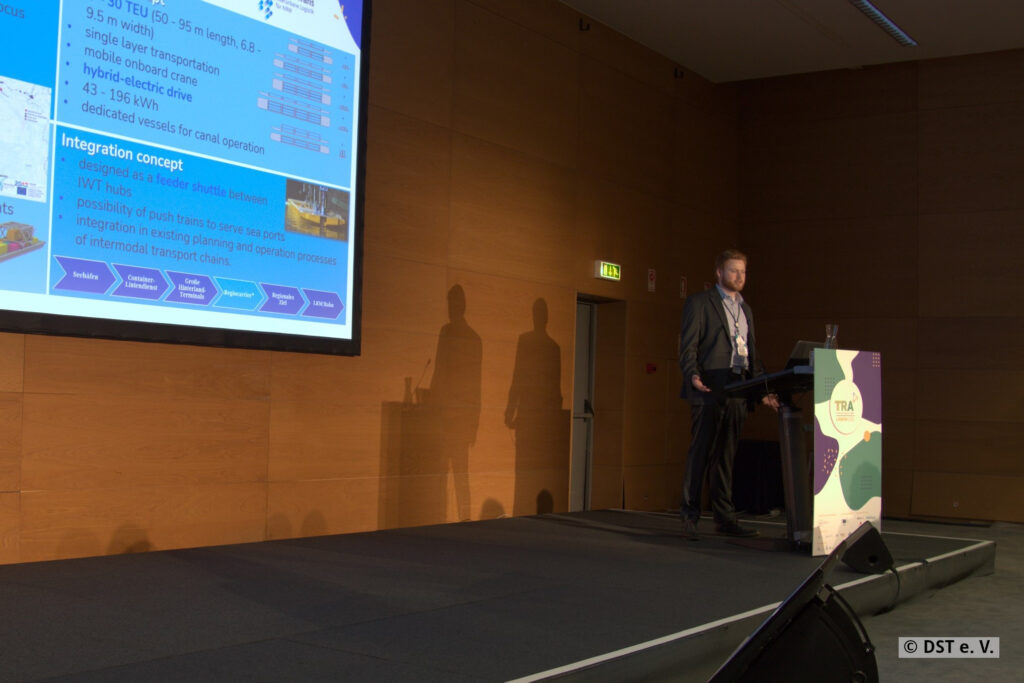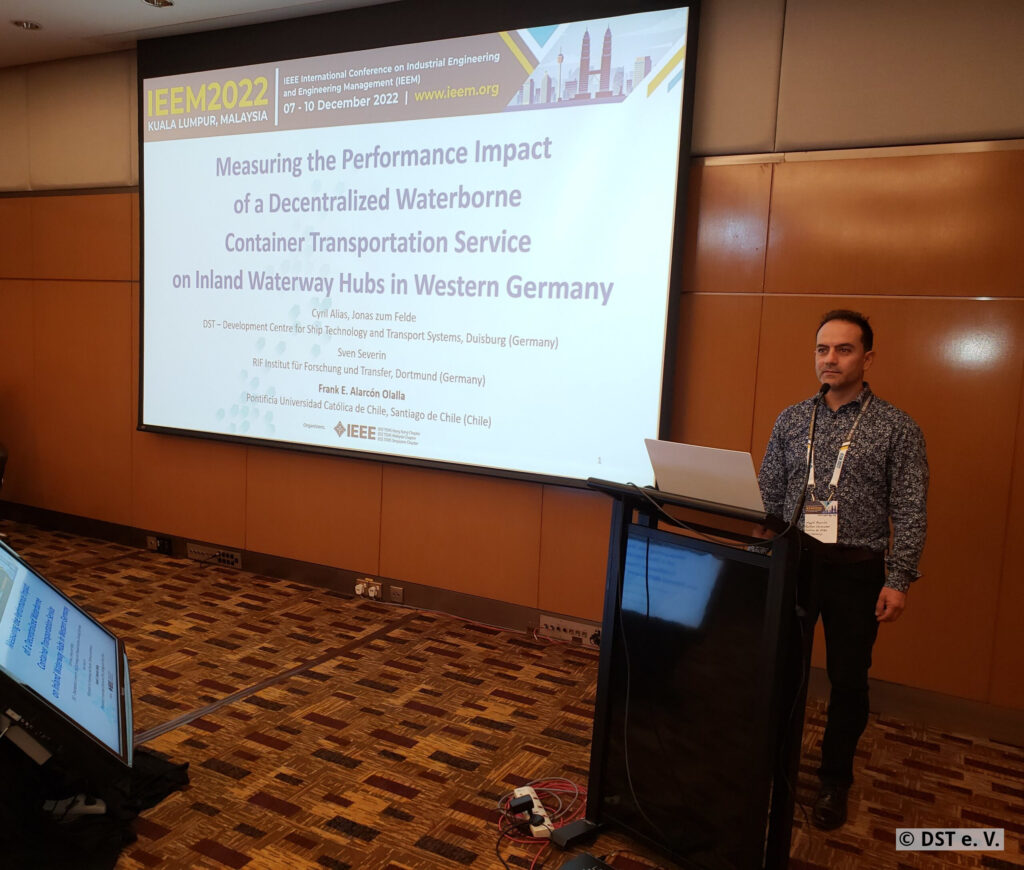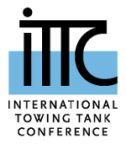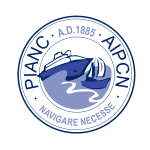DeConTrans
Innovative concepts for a decentralized waterborne container transport
Development of a concept for container distribution in North Rhine-Westphalia using small inland vessels and decentralised transhipment points
In metropolitan regions such as the Rhine-Ruhr area, the increasing container transport and the associated growth in road freight traffic are pushing the road infrastructure to its limits. The congestion of the roads leads to increased noise pollution and environmental pollution, as well as increased traffic jams. Inland navigation and the German waterways, especially in the western German canal network, offer logistics a considerable amount of unused capacity.
Therefore, an increased use of inland navigation presents itself as a solution to the initial situation. This offers more cost- and energy-efficient transport, but decision-makers are often not sufficiently aware of this fact and so inland navigation is primarily used in the metropolitan areas along the Rhine. The DeConTrans project focuses on the possibilities of container hinterland transport on the West German canal network as a feeder transport to and from the Rhine ports.
DeConTrans offers an innovative approach to container transport by inland vessel, building on existing transport concepts and complementing them in a meaningful way. It is a decentralised concept based on small, hybrid-electrically powered (and in future automatable) vessels. According to the current project status, the concept can be divided into four interconnected sub-concepts:
Logistics concept: After conducting intensive research and interviews with experts, a total of 105 possible transhipment points and six suitable navigable canals were identified in the western German canal network. The 105 transhipment points include the ports of Dortmund, Hamm, Herne, Münster and Osnabrück, but also suitable port structures of disused coal plants, among others. Destination ports for container transport are Duisburg and Wesel, via which further transport to the North Sea ports runs. Complex allocation rules were used to determine which transshipment point receives which freight volume. The transport network thus has a realistic flow of goods. A cost comparison with existing transport concepts that do not use the West German canal system is still pending.
Vessel concept: Small ships (8 to 36 TEU) suitable for the canal system are being developed. The transport can be carried out with one or, if necessary, two container layers. The configuration of the ships is adapted to the conditions of the canal system and includes a hybrid electric drive and automatic mooring systems. Scenarios with different personnel deployment plans are also being examined.
Transshipment concept: If available, the existing container transshipment structure of the transshipment points will be used. Further handling systems, a fixed crane stationed on the ship and a mobile shipboard crane, will be examined for suitability. These are to enable transshipment at transshipment points that do not have active or sufficient structures.
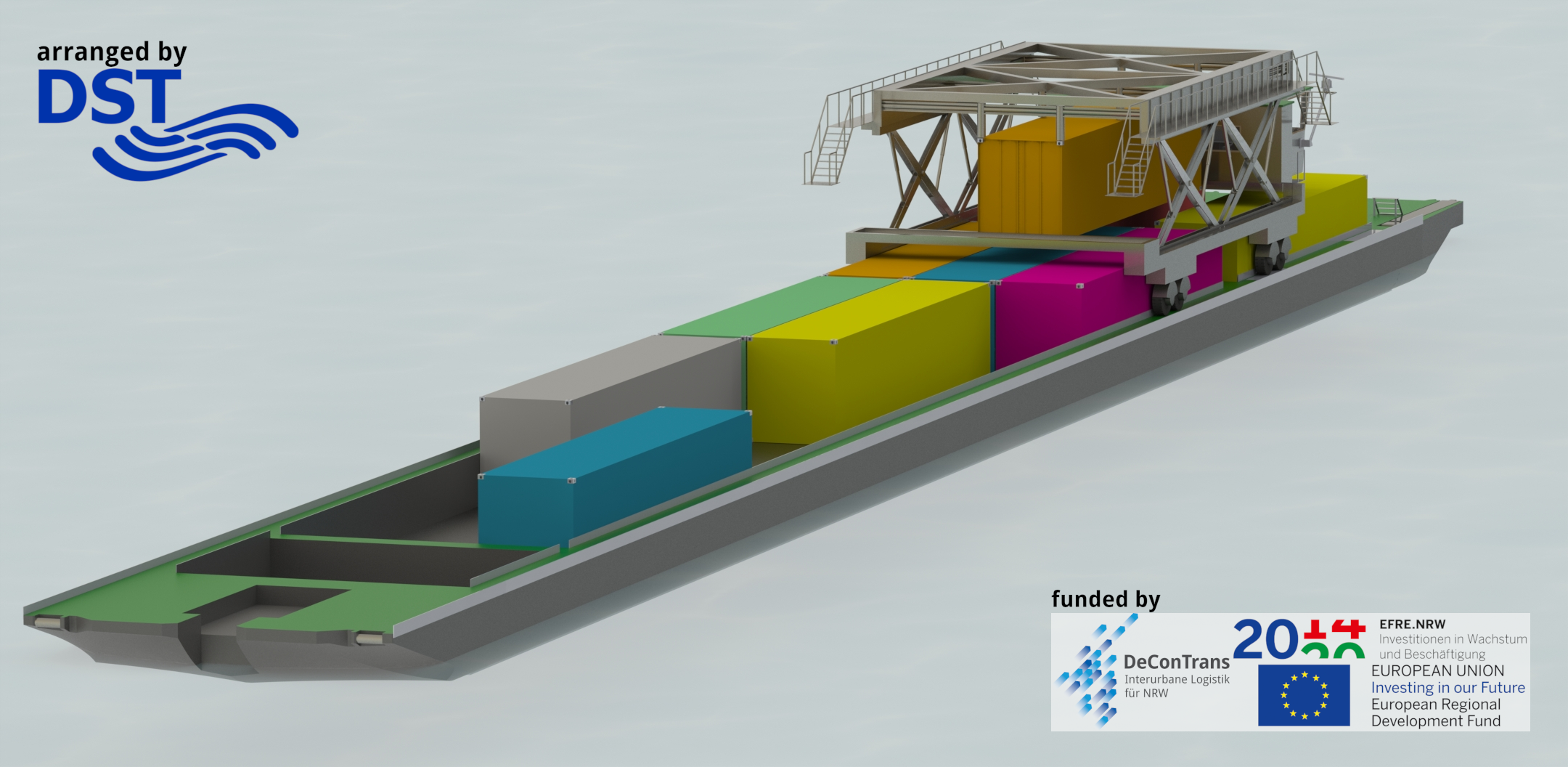 CAD rendering of the on-board crane concept for use in the canal network.
CAD rendering of the on-board crane concept for use in the canal network.
Integration concept: In order to demonstrate the viability of the West German canal system in existing transport and economic structures, a proof of integrability in today’s (global) supply chains will be presented within the framework of DeConTrans, involving all actors involved (ships, transhipment system, trucks). For this purpose, existing IT services and data management applications will be used, which are already successfully in use for existing supply chains.
A simulation environment will be created that prototypically models the relevant system components of the four concepts mentioned and enables the simulation of different scenarios. On the basis of this, an evaluation of different design options will be carried out with the help of predefined criteria, which will form the basis for the choice of the integrated transport system.
Together with the two research projects SPaCiH – SmartPark City Hubs and Virtual Infrastructure and iWALD – Integral World and Local Delivery, DeConTrans forms a consistent process flow of the future in which the goods are brought from the seaports via the waterway to North Rhine-Westphalia and unloaded at the numerous transhipment points in the western German canal network (DeConTrans), where they are fed into various value-added processes, such as sorting or finishing steps, and prepared for further transport (SPaCiH) and then transported in standardised small load carriers to the final recipient in urban distribution (iWALD). For this reason, the three projects have joined together to form a project family in order to align the respective developments with the sister projects and thus ensure future compatibility of the results as well as the feasibility of the process flow.
Overall, the DeConTrans project thus contributes to relieving the burden on the road and rail modes of transport and to the economic utilisation of the domestic waterways and their infrastructure. At the same time, emissions are reduced and sustainable management is made possible.
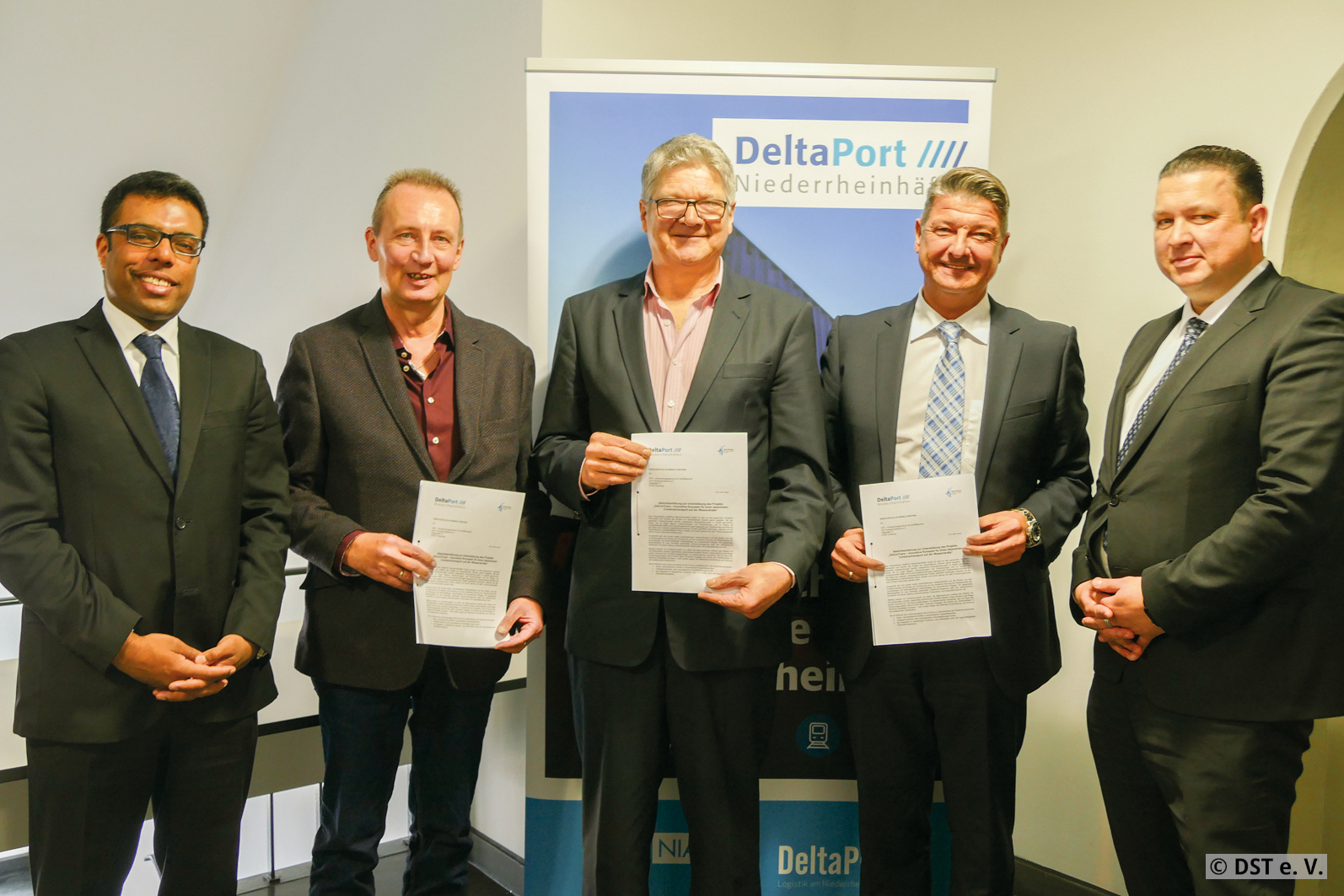 Welcoming DeltaPort GmbH & Co. KG to the project advisory board.
Welcoming DeltaPort GmbH & Co. KG to the project advisory board.
As part of the online event „Urban supply via inland waterways“ in the ‚JRF on site‘ event series, the final event of the research project „DeConTrans – Innovative concepts for a decentralized container transport on the waterway“ – with participation of the two JRF member institutes, DST and RIF – took place on 28 March 2022.
In addition to a series of technically related talks from all over Germany, the results of the DeConTrans simulation study could be presented there. Moreover, representatives from the shipping and port industries as well as from politics and research discussed the potentials of city logistics on inland waterways and the conditions necessary for this in a panel discussion.
Scientific publications:
Alias, C., zum Felde, J., Gründer, D., Severin, S., & Alarcón Olalla, F.E. (2023). Assessing the benefits of a decentralized waterborne container transportation service from the perspective of a canal port. In: Picado Santos L. de, Pinho de Sousa J., Arsenio E. (Eds.) Transportation Research Procedia: Vol. 72, TRA Lisbon 2022: Conference Proceedings Transport Research Arena (pp. 4444–4451). Amsterdam, Netherlands: Elsevier.
DOI – Link
Alias, C., zum Felde, J., Gründer, D., Severin, S., & Alarcón Olalla, F.E. (2023). Evaluating the Effects of a Decentralized Waterborne Container Transportation Service from the Perspective of an Inland Waterway Transport Hub. In: Proff, H. (Ed.) Towards the New Normal in Mobility: Technische und betriebswirtschaftliche Aspekte (pp. 811–837). Wiesbaden, Germany: Springer Gabler.
DOI – Link
Alias, C., zum Felde, J., & Severin, S. (2023). Examining the Logistics Performance of a Decentralized Waterborne Container Transportation Service in the West German Canal Network with the Help of Discrete-Event Simulation. In Y. Li, Y. Hu, P. Rigo, F. E. Lefler, & G. Zhao (Eds.), Lecture Notes in Civil Engineering: Vol. 264, Proceedings of PIANC Smart Rivers 2022: Green Waterways and Sustainable Navigations (1st ed., pp. 1357–1372). Singapore: Springer Nature.
DOI – Link
Alias, C., Gründer, D., Ley, J., Broß, H., Dahlke, L., & zum Felde, J. (2023). Wasserstraßen als urbane Versorgungsadern. In D. H. Schramm (Ed.), UNIKATE – Berichte aus Forschung und Lehre: Vol. 59. Mobilität und Transport im Wandel: Strategie und Umsetzung (pp. 58–71). Essen, Germany: Universität Duisburg-Essen.
DOI – Link
Alias, C., zum Felde, J., Severin, S., & Alarcón Olalla, F.E. (2022). Measuring the Performance Impact of a Decentralized Waterborne Container Transportation Service on Inland Waterway Hubs in Western Germany. In 2022 IEEE International Conference on Industrial Engineering and Engineering Management (IEEM) (pp. 965–969). Piscataway (NJ), USA: IEEE.
DOI – Link
Alias, C. & zum Felde, J. (2022). Evaluating the economic performance of a decentralized waterborne container transportation service using autonomous inland vessels. In 2022 IEEE 25th International Conference on Intelligent Transportation Systems (ITSC) (pp. 3571–3576). Piscataway (NJ), USA: IEEE.
DOI – Link
Alias, C., zum Felde, J., Broß, H., and Severin, S. (2022). Evaluating the impact of mobile onboard cranes on the logistics performance of a decentralized waterborne container transportation service. In N. Zrnic, G. Kartnig, & S. Bosnjak (Eds.), XXIV. International Conference on Material Handling, Constructions and Logistics: Proceedings (pp. 161-166). Belgrade, Serbia: Univerzitet u Beogradu, Mašinski Fakultet.
Link
zum Felde, J., Alias, C. and Goudz, A. (2022). Comparing generic and dedicated tools of discrete-event simulation for examining inland waterway transportation services. In 2022 IEEE 6th International Conference on Logistics Operations Management (GOL). Piscataway (NJ), USA: IEEE.
DOI – Link
Ley, J., Broß, H., & Kämmerling, E. (2022). Experimental Investigation of Passing Ship Effects on Moored Ships in a Canal Port. In M. Candries, E. Lataire, Z. Yuan, K. Eloot, & G. Delefortrie (Eds.), Proceedings of the 6th MASHCON International Conference on Ship Manoeuvring in Shallow and Confined Water – with special focus on port manoeuvres. Glasgow, United Kingdom.
Link
Alias, C., Broß, H., zum Felde, J., & Gründer, D. (2021). Enabling Decentralized Transshipment in Waterborne Container Transportation. In C. Jahn, W. Kersten, & C. M. Ringle (Eds.), Proceedings of the Hamburg International Conference of Logistics (HICL): Vol. 32, Adapting to the Future: Maritime and City Logistics in the Context of Digitalization and Sustainability. Pt. 2 (1st ed., pp. 137-166). Berlin, Germany: epubli GmbH.
DOI – Link
Alias, C., Pusch, L., Gründer, D., Dahlke, L., Broß, H., Heerwagen, O., & zum Felde, J (2021). Designing a Decentralized Waterborne Container Transportation Service using Small Inland Vessels. In Proff, H. (Ed.), Making Connected Mobility Work: Technische und wirtschaftliche Aspekte (pp. 573–601). Wiesbaden, Germany: Springer Fachmedien Wiesbaden.
DOI – Link
Alias, C., Dahlke, L., Heerwagen, O., Gründer, D., zum Felde, J., Pusch, L., & Severin, S. (2020). Identifying Suitable Transshipment Points for a Decentralized Waterborne Container Transportation Network. In 2020 IEEE International Conference on Industrial Engineering and Engineering Management (IEEM) (pp. 799–806). Piscataway (NJ), USA: IEEE.
DOI – Link
Alias, C., Gründer, D., Dahlke, L., zum Felde, J., & Pusch, L. (2020). Determining the Freight Volumes for a Decentralized Waterborne Container Transportation Service. In 2020 IEEE International Conference on Industrial Engineering and Engineering Management (IEEM) (pp. 786–793). Piscataway (NJ), USA: IEEE.
DOI – Link
Media review:
- Innovationsradar zur Mobilitäts- und Raumwende (Kompetenznetzwerk Umweltwirtschaft.NRW) (May 2023): DeConTrans – innovative Konzepte für einen dezentralen Containertransport auf der Wasserstraße (p. 34) [ger., DeConTrans – innovative concepts for a decentralized container transport on the waterway]
- einundzwanzig (Issue 2/2022): Bringdienste mit kleinen Schiffen [ger., Delivery services with small inland vessels] (pp. 22-23)
- Binnenschifffahrt Online (16.05.2022): Das Binnenschiff kann City-Logistik [ger., City logistics by inland vessel] (also in Issue 05/2022, p. 38)
- DOCK. Hafenmagazin (Dortmunder Hafen 21) (Issue 02/2022): Die Zukunft der Binnenschifffahrt [ger., The future of inland shipping] (pp. 8-9)
- BDB REPORT (Heft 01/2022): Branche informiert sich über Automatisierung und alternative Antriebe [ger., ] (pp. 14-15)
- Johannes-Rau-Forschungsgemeinschaft (28.03.2022): Veranstaltungsrückblick – JRF vor Ort: Urbane Versorgung über die Wasserstraße [ger., Event recap – JRF vor Ort: Urban supply via waterway]
- Logistik-Initiative Hamburg (18.06.2021): Marktanalyse zur Nutzung städtischer Kanäle und Fleete auf der letzten Meile veröffentlicht [ger., Market analysis about the usability of urban waterways and canals for last mile transportation released]
- Deutsche Verkehrs-Zeitung (DVZ) (27.04.2021): Citylogistik auf dem Wasser [ger., City on logistics on water]
- Maritimes Cluster Norddeutschland (22.03.2021): Veranstaltungsrückblick – Die Bedeutung der Binnenschifffahrt für Europa [ger., Event recap – The importance of inland navigation for Europe]
- econo (Issue 01/2021): Neue Ideen für die Lebensadern der Region [ger., New ideas for the region’s lifelines] (pp. 86/87)
- Zuse-Gemeinschaft (21.01.2021): Simulation untersucht Logistikkonzept mit kleinen Schiffen als realistische Alternative zu LKW Transporten [ger., Simulation study examines logistics concept with small inland vessels as a realistic alternative to road transport]
- Navigation Ports & Intermodalité (NPI) (Issue 01/2021): L’Allemagne est à la traîne mais des projets existent [frz., Germany falls behind, but there are plans] (pp. 32/33)
- Bractwo Mokrego Pokładu (27.12.2020): Przełomowe koncepcje dla żeglugi na płytkich wodach śródlądowych! [pol., Groundbreaking concepts for navigation in shallow water!]
- DOCK. Hafenmagazin (Dortmunder Hafen 21) (Issue 04/2020): Der Kanal wird 2021 zur Teststrecke [ger., The canal turns into a testbed in 2021] (p. 7)
- Deutsche Verkehrs-Zeitung (DVZ) (09.09.2020): DeltaPort will Verkehrsverlagerung vorantreiben [ger., DeltaPort wants to drive modal shift]
- Deutschlandfunk (06.09.2020): Flache Frachter – Neue Transportkonzepte für die Binnenschifffahrt [ger., Shallow freighters – New transport concepts for inland navigation]
- Binnenschifffahrt Online (01.09.2020): Logistikprojekt strebt Verkehrsverlagerung an [ger., Logistics project aims to further modal shift
- Deutsche Verkehrs-Zeitung (DVZ) (21.04.2020): Mit dem Schiff in die Stadt [ger., By inland vessel into the city]
- Schiffahrt Hafen Bahn und Technik (SUT) (Issue 02/2020): Regiocarrier für Container (pp. 108-109)
- Binnenvaartkrant (11.02.2020): Met 24 TEU over Duitse kanalen [dut., With 24 TEU via German channels] (p. 7)
- DeltaPort Niederrheinhäfen (06.02.2020): Transport auf der Wasserstraße: DeltaPort Niederrheinhäfen begleiten Forschungsprojekt zur Verkehrsverlagerung [ger., Transport by waterway: DeltaPort Niederrheinhäfen accompany research project on modal shift]
- Binnenschifffahrt Online (01.02.2020): Mit kleinen Schiffen gegen den Verkehrsinfarkt [ger., With small vessels against gridlock]
- Niederrhein Wirtschaft (Magazin der Niederrheinischen IHK) (Issue 01/2020): Von der Straße rein ins Wasser [ger., From the road into the water]
- Binnenvaartkrant (28.01.2020): Regiocarrier: nieuw type schip voor kleine terminals en verladers [Regiocarrier: Neuer Schiffstyp für kleine Terminals und Verlader] (p. 3)
- logistik journal (28.01.2020): Transport auf der Wasserstraße [ger., Transport on waterways]
- Niederrhein Nachrichten (25.01.2020): Niederrheinhäfen: Arbeit an der Verkehrsverlagerung [ger., Lower Rhine Ports: Working on modal shift] (p. 13)
- ShortSeaShipping Inland Waterway Promotion Center (spc) (25.01.2020): Transport auf der Wasserstraße [ger., Transport on waterways]
- THB (23.01.2020): „Deltaport“-Häfen wirken an innovativem Projekt mit [ger., DeltaPort participates in innovative project]
- Transport Online (22.01.2020): DeltaPort Niederrheinhäfen: Von der Straße auf das Wasser [ger., DeltaPort Niederrheinhäfen: From the road onto the water]
- Binnenschifffahrt Online (22.01.2020): Kleinere Schiffe sollen Verkehrsverlagerung beflügeln [ger., Smaller ships to spur modal shift]
- Maas Rhein Zeitung (21.01.2020): DeltaPort Niederrheinhäfen begleiten Forschungsprojekt zur Verkehrsverlagerung [ger., Deltaport Niederrheinhäfen accompany research project on modal shift]
- Deutsche Verkehrs-Zeitung (DVZ) (20.01.2020): Deltaport beteiligt sich an DeConTrans [ger., Deltaport participates in DeConTrans]
- Neue Ruhr Zeitung (NRZ) (21.01.2020): DeltaPort will Kanalnetz effektiver nutzen [ger., DeltaPort wants to use canal network more effectively]
- Tagesspiegel (12.12.2019): Captain Computer übernimmt [ger., Captain Computer takes over]
- DOCK. Hafenmagazin (Dortmunder Hafen 21) (Special Issue 120 years of Dortmund port): Die Zukunft der Binnenschifffahrt [ger., The future of inland shipping] (p. 31)
- Johannes-Rau-Forschungsgemeinschaft (10.04.2019): Veranstaltungsrückblick – JRF vor Ort: Logistik im Wandel [ger., Event recap – JRF vor Ort: Logistics in transition]
- Binnenschifffahrt Online (01.12.2018): Binnenschiffe im Schwarm im Kanal [ger., Barges in swarms on the canal]
- Logistik Heute (14.11.2018): Schifffahrt: Forschung untersucht neues Transportkonzept [ger., Shipping: Research investigates new transport concept]
Project duration:
- October 2018 – March 2022
Funding framework:
- EFRE.NRW Leitmarktwettbewerb „MobilitätLogistik.NRW“, 3. Wettbewerbsrunde
Project coordination:
- Jonas zum Felde, M.Sc.
E-mail: zumfelde@dst-org.de
Phone: 0203 99369-72
Project management:
- Cyril Alias, M.Sc.
E-mail: alias@dst-org.de
Phone: 0203 99369-52
Collaborative partners:
- DST – Development Centre for Ship Technology and Transport Systems
- RIF Institut für Forschung und Transfer e. V.
Associated partners:
- Generaldirektion Wasserstraßen und Schifffahrt (GDWS)
- Konecranes Terex MHPS GmbH
- DeltaPort GmbH & Co. KG
- Eisenbahn- und Hafenbetriebsgesellschaft Region Osnabrück mbH
- Gelsen-Log – Gelsenkirchener Logistik-, Hafen- und Servicegesellschaft mbH
- Hafenband am Mittellandkanal
- MARLO Consultants GmbH
- Mercatronics GmbH
- Mindener Hafen GmbH
- Modal 3 Logistik GmbH
- MSG eG
- MTS Wasseropal GmbH (HTS Group)
- w3logistics AG
Associated projects:
Predecessor project:
Follow-up projects:
